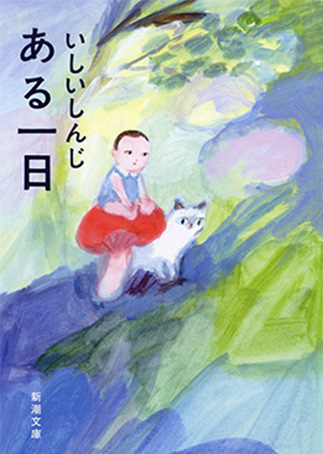
KINKI
Aru ichinichi
[One Day]
Shinchōsha (Shinchō Bunko), 2014. 141 pp. ¥400. ISBN 978-4-10-106932-6.
Also published in: n/a
Aru ichinichi reveals a new and entirely unexpected side to Ishii Shinji’s talent. Until now, he has been known mostly for his surrealistic fantasies and fairy-tale settings, but this story of a married couple—to all appearances, the author and his wife—reads more like a conventional autobiographical novel. Even when he is writing about ordinary everyday life, though, Ishii allows his imagination to wander far afield. His reflections span the globe—from an eel spawning ground to the Yaeyama Islands of Okinawa and Latin America—and the writing, full of mushrooms, frogs, and other strange images, brings a touch of the surreal to its depictions of the everyday world.
Ishii also writes about food in appetizing detail, providing masterful descriptions of scenes in which the characters prepare and enjoy traditional Japanese foods like matsutake mushrooms and hamo (pike conger).
The second half of the book is a dramatic account of the birth of the couple’s child in a maternity hospital in Kyoto, where the wife is determined to give birth naturally, even though she is having her first child at the age of forty-three. Although childbirth is a basic part of life, it is a subject that is rarely addressed in contemporary Japanese literature. In his imaginative depiction of the fetus just before birth, as a living thing that moves and feels within the womb, Ishii transcends the limitations of the documentary I-novel. This alone would be enough to make his novel an important, groundbreaking achievement. (NM)
Ishii also writes about food in appetizing detail, providing masterful descriptions of scenes in which the characters prepare and enjoy traditional Japanese foods like matsutake mushrooms and hamo (pike conger).
The second half of the book is a dramatic account of the birth of the couple’s child in a maternity hospital in Kyoto, where the wife is determined to give birth naturally, even though she is having her first child at the age of forty-three. Although childbirth is a basic part of life, it is a subject that is rarely addressed in contemporary Japanese literature. In his imaginative depiction of the fetus just before birth, as a living thing that moves and feels within the womb, Ishii transcends the limitations of the documentary I-novel. This alone would be enough to make his novel an important, groundbreaking achievement. (NM)

Translation rights inquiries
Shinchōsha Publishing Co.
(attn. Overseas Publications Section)
71 Yarai-chō, Shinjuku-ku, Tokyo 162-8711
Email: ops@shinchosha.co.jp
(When sending an e-mail, please enter a half-width character "@" instead of a full-width character "@.")

